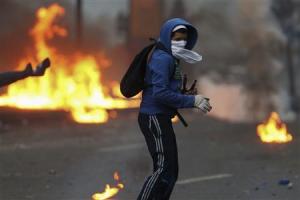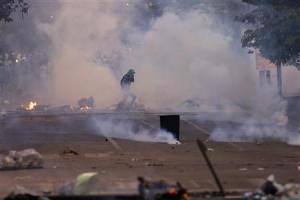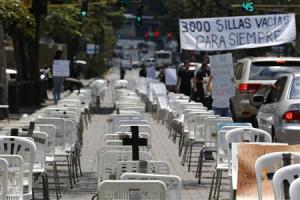Venezuela's Maduro gives ultimatum to Caracas protesters
By Deisy Buitrago and Andrew Cawthorne
CARACAS (Reuters) - Venezuela's President Nicolas Maduro warned protesters in Caracas on Saturday to clear a square they have made their stronghold, or face eviction by security forces.
Plaza Altamira, in upscale east Caracas, has been a focus of anti-government protests and violence during six weeks of unrest around Venezuela that has killed 28 people.
"I'm giving the Chuckys, the killers, just a few hours," Maduro said, using the name of a murderous child-doll in a horror film to describe anti-government demonstrators who have made the normally genteel 1940s square a base of operations.
"If they don't retreat, I'm going to liberate those spaces with the security forces," Maduro added. "They have a few hours to go home ... Chuckys, get ready, we're coming for you."
Students and other protesters have been using the square, in the pro-opposition Chacao district of Caracas, as a rallying point since a wave of protests started to gather steam in mid-February.
Most nights around dusk, a hard core of several hundred demonstrators has been fighting police and army lines there, in an attempt to access a nearby highway and block traffic.
On Friday night, for example, security forces used water cannon and teargas in a battle against protesters using stones and petrol bombs, Reuters witnesses said.
At least a dozen people were arrested, and the noise of the fighting echoed across east Caracas for several hours.
In a speech at a military rally, Maduro also alleged that right-wingers in the State Department and Pentagon were recommending extreme measures against the Venezuela government, including economic sanctions and even his assassination.
"President (Barack) Obama, if this message reaches you, you should know that it would be the worst mistake of your life to sign the authorization of the assassination of President Nicolas Maduro," he said in a high-octane speech recalling his predecessor Hugo Chavez's spats with the United States.
The U.S. government says Maduro, like Chavez, is inventing "imperialist" threats to distract Venezuelans' attention from their domestic political divisions and economic problems.
But U.S. antipathy to the Socialist government has been in evidence since the start of Chavez's 1999-2013 rule, not least in Washington's quick recognition of a brief 2002 coup against him.
Chavez died from cancer last year, with his protege Maduro, a 51-year-old former bus driver, winning a vote to replace him.
As well as the 28 deaths, including supporters of both sides and members of the security forces, more than 300 people have been injured in Venezuela's worst unrest in a decade.
More than 1,500 people have been arrested, of whom about 100 are still in jail. They include 21 security officials accused of using excess force.
Maduro says he has seen off a "coup" attempt, and he does not look in danger of being toppled by a "Venezuelan Spring," with the military apparently still behind him.
But a radical rump of students and hardline political leaders are vowing to stay in the streets until Maduro goes. They were planning a march in Caracas on Sunday to protest the presence of Cuban advisers for Venezuela's armed forces.
As dusk fell on Saturday, there were only a handful of protesters in Altamira Square, but some demonstrators were starting to put up barricades of rubbish on other streets in the zone.
(editing by Gunna Dickson)





No comments:
Post a Comment